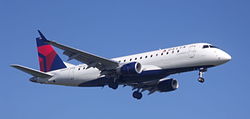"Take-off Tax"
In 2011, the RAA opposed President Obama's recent bill to add a $100 tax to each Part 121 (Regularly Scheduled Airline) and each Part 135 (Charter) flight in the USA. Roger Cohen, president of the RAA stated,
"This tax would place the heaviest burden on regional airlines that provide the only source of scheduled air service to over 75 percent of the nation's airports. This jeopardizes air service to some 500 U.S. communities relying on regional airlines exclusively for their scheduled flights. Make no mistake. This tax jeopardizes air service at places where air service is the only link to the global economy, putting smaller communities out of business." [6]
The bill did not pass.
Enhancing Airline Passenger Protections
The final rule, which was published on April 25, 2011, as 76 Federal Regulation 23110, [7] includes raising the minimum "denied boarding compensation" to customers with valid tickets yet still not allowed to board the aircraft. The legislation further penalizes airlines up to $27,500 a passenger if left stranded aboard an aircraft, on a tarmac for more than three hours. [8] In 2010, the Regional Airline Association and all of its member airlines opposed this legislation stating that they could regulate themselves and they already had begun implementing systems by which to mitigate any tarmac delays. [9] Later American Eagle, an RAA airline member, was the first airline to be fined under the new legislation. A total settlement including fines and compensation paid to passengers totaled $800,000 for tarmac delays incurred in Chicago in May 2011. [8]
1500 Hour Pilot Rule (HR 5900)
When the bill passed in 2010, the minimum required hours for a pilot to serve as a first officer (co-pilot) in an airline transport capacity was 250 hours. In July 2013, HR 5900 increased this requirement to 1500 hours and possession of an Airline Transport Certificate (ATP). Prior to this, a first officer only needed a Commercial Certificate, while the captain was required to have their ATP. Then Senior Vice President of the RAA, Scott Foose has commented before the Federal Aviation Association that he didn't think the rule had relevance since, as he commented, both of the pilots involved in the crash of Continental Express 3407, which the legislation was inspired by, had over 1500 hours. Foose argued that HR 5900's clause allowing for academic substitution of flight experience should be invoked. [10] Foose said,
The FAA has, through the rule-making process, the opportunity to amend the ATP standards to allow for academic credit in lieu of some flight time. Unless the FAA's new rule recognizes the value of some of the new academic flight training programs, we'll see a decrease in the pilot supply. It's not just a safety issue. It is also about diminishing service to communities that are receiving scheduled air service today. [10]
Earlier in 2010 however, Cohen, the former RAA president, didn't seem to have those concerns, shortage or not. When addressing the concern of growing disinterest in the occupation of airline pilot, due to both the new 1500 hour rule and plummeting pilot pay, the RAA president stated "We're confident our members will be able to navigate any perceived or real pilot shortage, just like we have done historically." [11]



